Herbal Healers VIII
Herbal Healers VIII
Meshashringi
Scientific name : Gymnema sylvestre,
Family : Apocynaceae
Vernacular name
- Bengali : Medhasingi
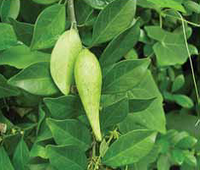
- English : Periploca of the wood
- Gujarati : Kaavalee, Medhasinge
- Hindi : Gudmaar, Medhaa Singee
- Kannada : Kadhasige
- Malayalam : Cakkarakkolli, Madhunaashini
- Marathi : Kaavalee, Medhaashingi
- Tamil : Shirukurum Kaay, Shakkaraikkolli
- Telugu : Podapatro
Medicinal Uses
- Diabetes: Intake of 5 grams of meshashringi leaves powder daily 2 to 3 times a day before food regularly is useful to control diabetes mellitus. High doses of this medicine may help to regenerate Beta cells of Pancreas study and research says.
- Polyurea: 5 gms of meshashringi leaves powder should be administered with warm milk in case of polyurea.
- Obesity: 10gms of meshashringi leaves paste boiled in 100ml of water till it reduced to 25ml. This decoction administered twice a day for 3 to 4 weeks is beneficial in obesity and hypercholestrolemia etc.
- Wound: Root powder of meshashringi can be dusted or applied as a paste on the wounds for healing.
- Constipation: 5gms of meshashringi leaves powder with warm water should be taken at bed time to cure gastrointestinal disorders like constipation and gas trouble.
Methi
Scientific name : Trigonella foenum-graecum
Family : Fabaceae
Vernacular name
- English : Fenugreek
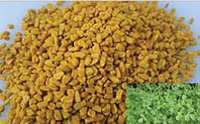
- Gujarati : Methi
- Hindi : Methi
- Kannada : Menthe, Mente
- Malayalam : Uluva
- Marathi : Methi
- Punjabi : Methi
- Tamil : Mendium, Ventaiyam
- Telugu : Mentulu
- Urdu : Methi
Medicinal Uses
- Dyslipidaemia: 10 gram Methi powder is administered along with warm water or buttermilk twice daily reduces cholesterol significantly.
- Prameha (Diabetes): The powder prepared from equal quantity of methi seeds and turmeric should be administered in the dose of 5 -10 grams daily along with water, preferably on empty stomach.
- Gastritis: 10 gram of seeds are soaked in water overnight. Next day morning this is macerated well and is consumed this paste, 30 minutes before food. It relieves the reflux esophagitis and gastritis.
- Indigestion: 5-10gms Fenugreek seeds are fried a little and cooked well with milk (by adding little sugar, if necessary). This gives good strength to the intestines and improves the digestion.
- Lactation: 10gms of methi seeds are cooked well with 200 ml of milk and add jaggery till it reduced to 100ml. Internal administration of this milk twice daily helps to increase breast milk production.
- Piles: 10gram methi seeds powder consumed with lukewarm water along with half spoon of ghee. This relieves constipation as well as piles.
- Hair fall: 50 gram of fenugreek seeds, 150 ml coconut or sesame oil is added and kept in sunshine for 6 days. Then it is filtered and stored. Regular application of this oil acts as a good hair tonic.
- Hair conditioner: 10 gram of methi seeds are soaked in water and kept overnight. Next day morning made into fine paste and is applied to the scalp as hair mask. This is retained for 30-45 minutes and rinsed with water. This acts as a natural conditioner for hair.
Mishreya
Scientific name : Foeniculum vulgare
Family : Apiaceae
Vernacular name
- Assamese : Guvamuri
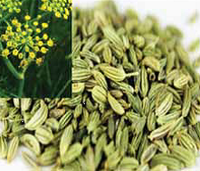
- Bengali : Marui, Panmauri
- English : Fennel seeds
- Gujarati : Variyali
- Hindi : Saunf
- Kannada : Badisompu, Doddasompu
- Kashmiri : Sanuf, Badnai
- Malayalam : Kattusatakuppa, Parinjaeragum
- Marathi : Badishop
- Oriya : Panamadhuri
- Punjabi : Saunf
- Tamil : Shombu
- Telugu : Sompu
- Urdu : Saunf
Medicinal Uses
- Indigestion: Equal quantity of Mishreya (Fennel) seeds and cardamom are made into fine powder. Take 3gms of this mixture along with luke warm water after meals.
- Bad breath: Gargle with warm Mishreya (Fennel) water (10gms of fennel seeds boiled in 100ml of water in low flame for 5-10 min) daily once for 7days.
- Heat stroke: Keep handful of Mishreya (Fennel) seeds soaked in 200ml of Hot water overnight. Next morning, strain the solution. Mix a pinch of Black salt and little sugar in it and drink this solution.
- Colic: Take 10 gms of Mishreya (Fennel) seeds in 100ml of water and add 100gms of sugar. Boil this mixture until it become thick like syrup consistency. Feed 5ml of this syrup to the baby 2-3 times a day.
- Obesity: 5gms of haritaki powder, 5gms of Mishreya (Fennel) seed powder are boiled in 100ml of water till in reduced to 1/4th. Strain and mix a teaspoon of honey and drink this solution in the morning on an empty stomach.
- Lactation: Take 5gms of Mishreya (Fennel) powder in a cup of barley soup 2 to 3 times a day to increase breast milk.
Mulaka
Scientific name : Raphanus sativus
Family : Brassicaceae
Vernacular name
- Assam : Mulo
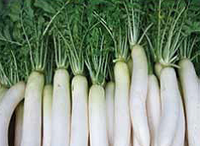
- Bengali : Mula
- English : Radish
- Gujarati : Mulo
- Hindi : Muli
- Kannada : Moolangi, Moolaogi, Mullangi, Mugunigadde
- Malayalam : Mullanki
- Marathi : Mula
- Oriya : Mula, Rakhyasmula
- Punjabi : Moolak, Moolee, Moola
- Tamil : Mullangi, Mulakam, Mullangu, Millangi
- Telugu : Mullangi
- Urdu : Turb, Mooli
Medicinal Uses
- Obesity: 1-2 big radish roots are chopped and is added into 500ml of hot water and kept for 1-2 hours. Later it is filtered and this water is used for drinking throughout the day. This helps to reduce the body weight.
- Dyslipidaemia: 20-30ml of radish juice is mixed with equal quantity of water and one tsp of lemon juice and little honey. This is taken on empty stomach daily for 30- 40 days. This reduces the bad cholesterol significantly.
- Eyecare: Fresh juice of radish green leaves in the dose of 20- 30ml consumed twice daily, before food is considered good for eyes, relieves burning, itching and excess lacrimation and useful in night blindness.
- Leucoderma: 50 ml of radish juice is cooked with 100 ml of sesame oil till all the moisture is last from the oil. Then it is filtered and stored. Regular application of this oil over the lesions of leucoderma has good benefits followed by suitable internal medication.
- Skin Allergy: Paste of1-2 Raddish roots is applied over the skin/face. This is retained for 15-20 minutes and washed thoroughly (avoid those highly sensitive to radish). This rehydrates and detoxifies the skin.
- Urinary Calculi: Regular intake of 20-30 ml of Radish juice daily once after food for 3months is beneficial in Urinary calculi.
Mundi
Scientific name :Sphaeranthus indicus
Family : Asteraceae
Vernacular name
- Assamese : Kamadarus
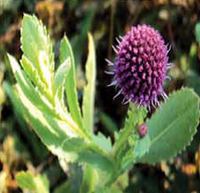
- Bengali : Surmuriya, Mudmudiya
- English : East India Globe Thistle.
- Gujarati : Gorakhmundi
- Hindi : Mundi, Gorakhmundi
- Kannada : Mudukattanagida, Karande
- Malayalam : Manni
- Marathi : Mundi, Gorakhmundi
- Oriya : Bhuikadam
- Punjabi : Gorakhmunda
- Tamil : Karandai
- Telugu : Bodasarumu Badataramu
- Urdu : Mundi
Medicinal Uses
- Skin disease: The leaves of mundi are dried in shade, powdered and given in the dose of 3 grams twice daily internally useful for skin ailments as blood purifier.
- Body Heat: The powdered flowers of mundi given in the dose 1 gram with water twice daily provides coolness to the body and also acts as a tonic.
- Worm Infestation: Consume 5gms of root powder of mundi with jaggery twice daily for a week is useful in expulsion of intestinal worms.
- Menorrhagia : Internal Administration of 5gms of plant paste of mundi with butter milk twice daily beneficial in treating bleeding piles and menorrhagia.
- Joint pains: Internal administration of 3gms of Mundi powder with 3gms of Dried ginger powder with warm water twice daily relieves arthritis (joint pains).
- Headache: Internal administration of 10ml of mundi juice with a pinch of black pepper twice daily alleviates hemicrania (a type of headache) with in a week.
Musta
Scientific name :Cyperus rotundus
Family : Cyperaceae
Vernacular name
- Assam : Mutha, Somad Koophee
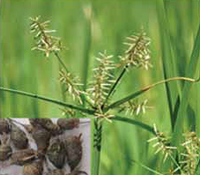
- Bengali : Mutha, Musta
- English : Nut Grass
- Gujarati : Moth, Nagarmoth
- Hindi : Motha, Nagarmotha
- Kannada : Konnari Gadde
- Malayalam : Muthanga, Kari Mustan
- Marathi : Moth, Nagarmoth, Motha, Bimbal
- Punjabi : Mutha, Motha
- Tamil : Korai, Korai-Kizhangu
- Telugu : Tungamustalu
- Urdu : Sad Kuf
Medicinal Uses
- Fever: The powder prepared from equal quantity of Mustha, Parpata, Dry ginger, Long pepper administered in a dose of 5gms with hot water thrice daily cures fever.
- Breast abcess: Administration of decoction (5gms of mustha tuber boiled in 100 ml water till it reduced to 25ml) twice daily for 15 days is useful to treat pus discharge from breast or any swellings in breast.
- Diarrhoea: Musta tuber powder can be administered in a dose of 3 gms thrice daily with butter milk is useful in diarrhoea, indigestion, etc.
- Common cold: 5 gms of coarse powder of musta boiled in 100ml of milk till it reduced to 50ml. This milk is given daily once to both children and adults in case of asthma, common cold and chest congestion etc.
- Gastritis: The decoction of musta (5gms of mustha cooked in 100ml of water and reduced it into 25 ml) is very effective in peptic ulcer and inflammatory conditions.
- Bad odour: External application of the musta paste all over the body daily before bath for bad odour due to sweat .
Nagakesara
Scientific name :Mesua ferrea
Family : Guttiferae
Vernacular name
- Assamese : Negeshvar, Nahar
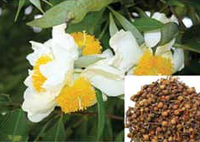
- Bengali : Nageshvara, Nagesar
- English : Cobras Saffron
- Gujarati : Nagkesara, Sachunagkeshara, Nagchampa, Pilunagkesar, Tamranagkesar
- Hindi : Nagkesara, Pila Nagkesara
- Kannada : Nagsampige, Nagakesari
- Malayalam : Nangaa, Nauga, Peri, Veluthapala, Nagppu, Nagappovu
- Marathi : Nagkesara
- Punjabi : Nageswar
- Tamil : Naugu, Naugaliral, Nagachampakam, Sirunagappu
- Telugu : Nagachampakamu
- Urdu : Narmushk, Nagkesar
Medicinal Uses
- Diarrhea with blood: 3grams of Nagakesar stamen powder with warm water twice daily is an excellent remedy.
- Piles: 2-3 grams of Nagakesar powder is taken and rubbed well with ghee and made a fine paste. This is applied to the anal region in cases of piles. It is given internally also in the dose of 3 grams once or twice a day to stop heavy bleeding caused due to piles.
- Postpartum Care : Equal (Each 3 gms) of Nagakesar and seeds of sounf(fennel seeds) are taken and fine powder is made or else its decoction is made. This is consumed twice daily for 3-4 days regularly. This helps to cleanse the uterus in the conditions like abortion and after delivery
- Skin glow: 1-2 pinches of naganeear rubbed well with water and add red sandalwood (Raktachandan). This paste is applied over the face after thorough wash of face. Regular application helps to get lustrous skin and to remove the dark marks over the face.
- Leucorrhoea: 3gms of Nagakesar powder taken with one cup of buttermilk for twice a day and keeping on diet of buttermilk is beneficial.
Nagavalli
Scientific name :Piper betle
Family : Piperaceae
Vernacular name
- Assamese : Pan
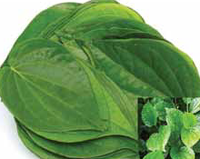
- Bengali : Pan
- English : Betel Leaf
- Gujarati : Pan
- Hindi : Pan
- Kannada : Veelyadele Ele
- Malayalam : Vettila
- Marathi : Pan, Nagvel, Vidyachepan
- Punjabi : Pan
- Tamil : Vettilai
- Telugu : Tamalapaku, Tamulapaku
- Urdu : Pan
Medicinal Uses
- Colic: Apply castor oil on smooth surface of 2-3 broad betel leaves. Warm them little and place them on stomach. By doing this 3-4 times the colic pain will subside.
- Bad breath: Chewing betel leaves after meals helps to reduce foul breath as well as eases digestion. It will increase secretion of digestive juices, decreases bloating of stomach, cleanses the oral cavity, reduces constipation.
- Wound: Grind the leaves, extract the juice, apply on the wounds, wrap a betel leaf as well as bandage the wound.
- Burns: Mix betel leaves paste with honey and apply over the burns.
- Sore throat: Take 5 ml of betel leaves juice and 5gms of licorice powder mix in a glass of warm water. This water can take internally as well as gargle. Singers can frequently utilize this cure to maintain their vocal chords healthy.
- Cough: Betel leaves drenched in mustard oil, slightly warmed and applied on the chest, reduces cough as well as breathing problems in children.
Narikela
Scientific name :Cocos nucifera
Family : Arecaceae
Vernacular name
- Assamese : Khopra
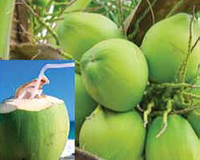
- Bengali : Narikel, Narikel
- English : Coconut Palm
- Gujarati : Naliar, Nariyel, Shriphal, Koprun
- Hindi : Nariyal, Gola
- Kannada : Khobbari, Tengnamara, Temgu, Thengu, Thenginamara
- Malayalam : Nalikeram, Ten, Thengu, Keram
- Marathi : Naral
- Oriya : Nariyal
- Punjabi : Narela, Khopra, Garigola
- Tamil : Tenkai, Kopparai
- Telugu : Narikelamu, Tenkay, Kobbari
- Urdu : Narjil, Narial
Medicinal Uses
- Renal calculi: Intake of coconut flower paste 2gms with curd once a day is effective against kidney stones.
- Postpartum Care: Administration of linctus prepared from flowers of narikela helps to improve health of uterus, regulate bleeding after delivery and acts as galactogogue
- Diaper Rash: coconut oil regular massage of the body of infants prevent skin ailments and diaper rash. It prevents flaking and dryness of skin, dry eczema, wrinkling, sagging, skin inflammation, itching and ringworm infection etc.
- Burning Micturation: Regular consumption of tender coconut water acts as a diuretic, prevents U.T.I (Urinary Tract Infection) and helps in flushing out kidney stones.
- Hair fall: Coconut oil massage for scalp is good and improves hair growth.
- Diarrhoea: Intake of tender coconut water helps to maintain fluid balance and prevent dehydration especially during scotching summer or in diseases like diarrhea, malaria, typhoid and Chicken-pox etc.
- Bleeding Gums: The burnt coconut shell fine powder mixed with edible camphor has to be massaged on gums to treat bleeding gums and also strengthen the gums.
Nimba
Scientific name :Azadirachta indica
Family : Meliaceae
Vernacular name
- Assamese : Mahanim
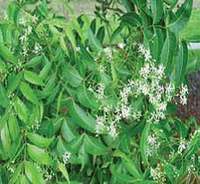
- Bengali : Nim, Nimgach
- English : Margosa Tree
- Gujarati : Limba, Limbado, Limado, Kohumba
- Hindi : Nim, Nimba
- Kannada : Nimba, Bevu, Oilevevu, Kahibevu, Bevinama
- Malayalam : Veppu, Aryaveppu, Nimbam, Veppa
- Marathi : Balantanimba, Limba, Bakayan, Nim, Kadunimb
- Oriya : Nimba
- Punjabi : Nimba, Bakan, Nim
- Tamil : Vemmu, Veppu, Arulundi, Veppan
- Telugu : Vemu, Vepa
- Urdu : Neem
Medicinal Uses
- Blood purifier: Neem leaves help in purify the blood. The patient should chew 10‒12 neem leaves or have half cup of fresh juice of neem leaves daily in the morning.
- Diabetes: One cup of juice of neem leaves mixed with a pinch of black pepper powder must be taken in the morning on an empty stomach for three months. This helps to reduce the blood sugar the diabetes.
- Wound: The paste of Neem leaf powder and honey should be applied over the wound.
- Acne: The paste of fresh leaves of neem should be applied on acne.
- Urticaria: 3gms of neem leaves paste and 3gms of amalaki powder mixed with ghee taken internally two times a day useful in Urticaria.
- Head lice: Regular Massaging the scalp with Neem oil, removes head lice and prevent dandruff .
- Mosquitoes Repellent: Fumigating the house with dried neem leaves or all parts of the plant mixed with ghee, acts as mosquitoes repellent.
Source: Ayurveda offering Herbal healing
Last Modified : 3/2/2020
